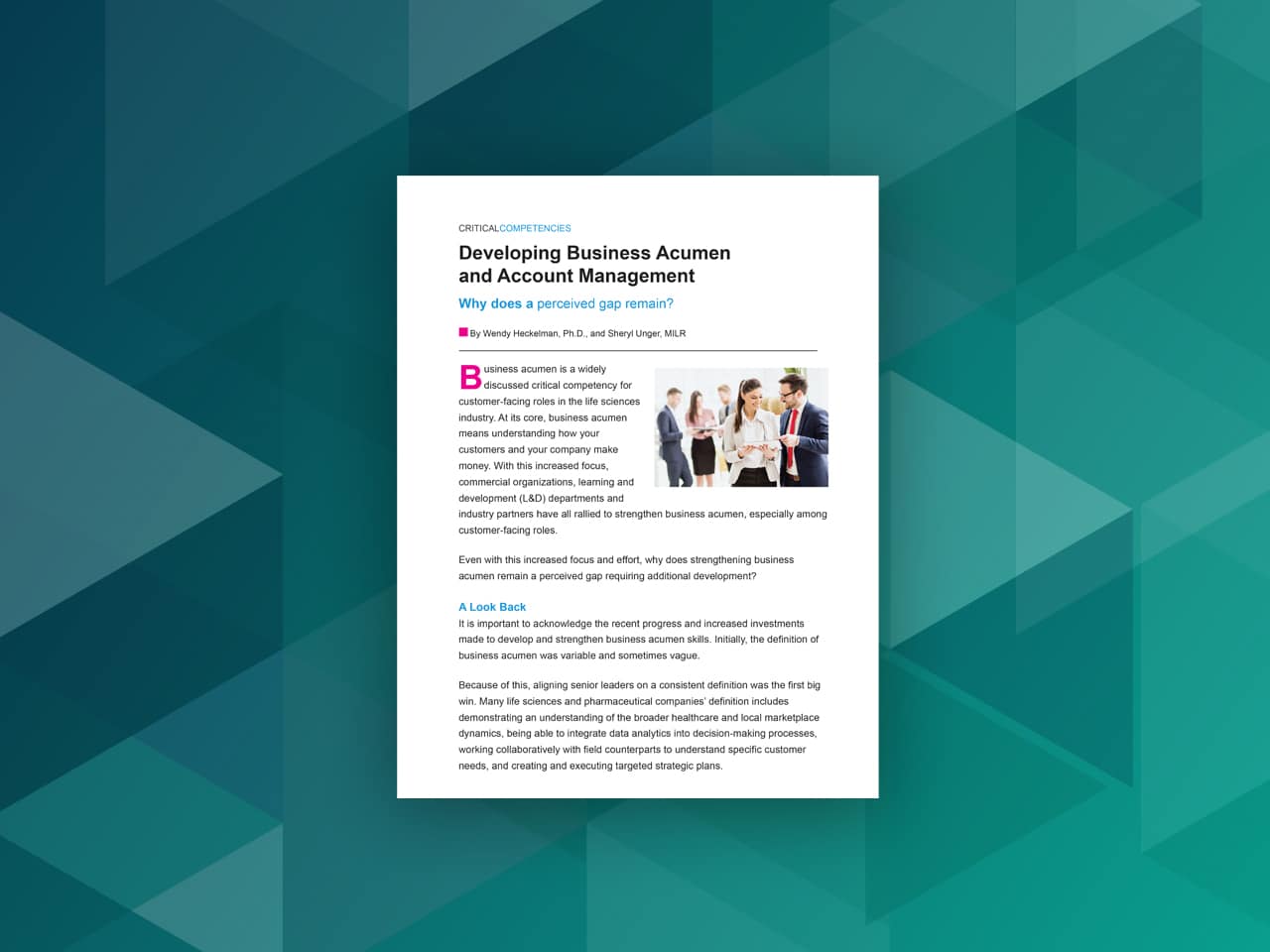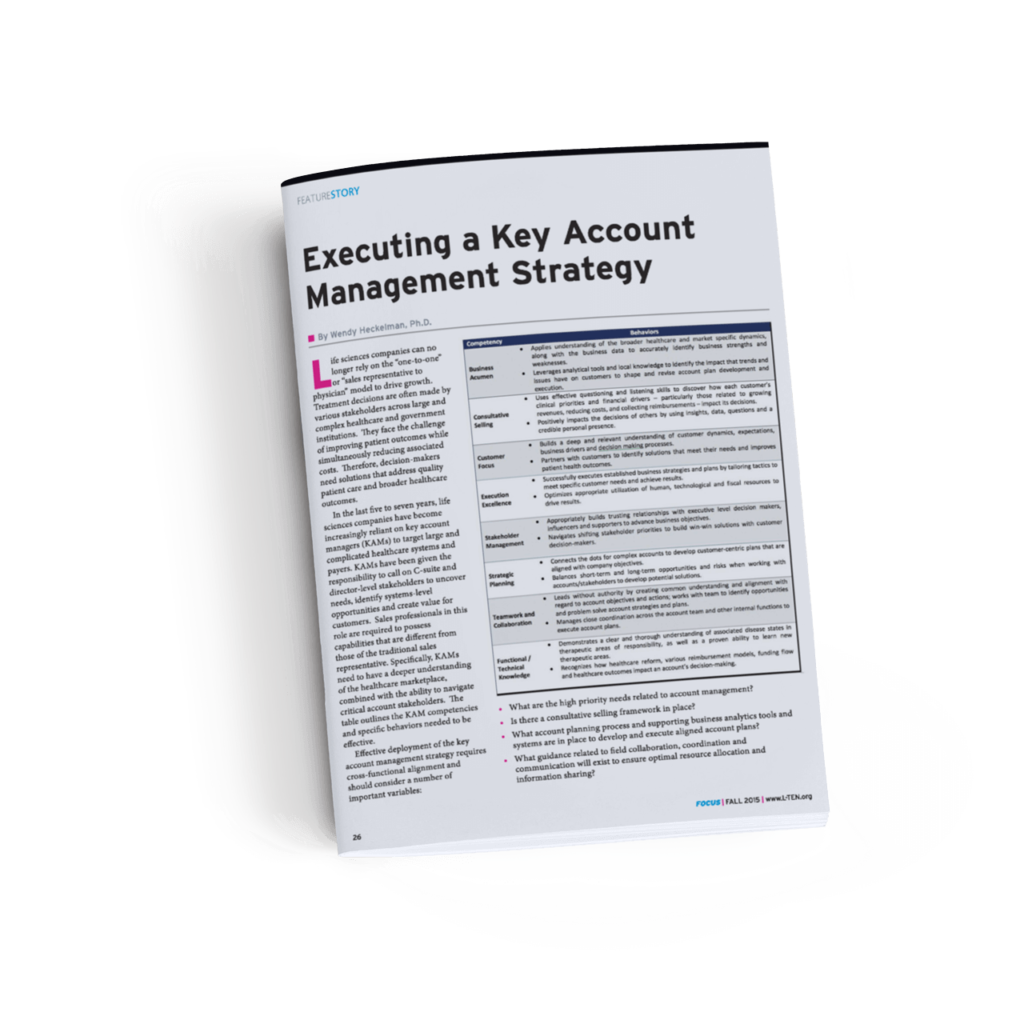Explore the critical competencies of business acumen and account management in the life science industry and understand how…

We partner with commercial leaders and the HR, OD, and L&D professionals who support them to define commercial excellence and translate their vision into a reality.

By leveraging our expertise in creating territory or account planning processes and tools, and our customized blended learning solutions in business acumen skills, we are able to help clients improve access, strengthen customer relationships, engage employees, and accomplish business results.

With the consolidation of the organized customer limiting access, the pharmaceutical and life sciences industry needs to build strategic account capabilities. No one role can independently achieve access, partner to provide solutions, and drive results. We partner with market access and sales leaders to develop strategic account planning processes, tools, and skills with a focus on operationalizing the cross-functional collaboration required to achieve trusted advisor status.
Over the last 30 years, we’ve watched pharmaceutical and life sciences companies shift to a greater reliance on strategic account management to obtain access and grow with payers, healthcare delivery systems, and other evolving healthcare business models. We know companies are at various stages of sophistication in developing and executing account management strategies. We meet you where you are to create an account management mindset and accelerate the journey to trusted advisor status.
We do this by:

Business acumen is frequently identified by leaders in the pharmaceutical and life sciences industry as an organizational gap requiring new or additional knowledge or capabilities. These capabilities include being able to accurately assess the business landscape, form hypotheses, and make sound business decisions. For pharmaceutical professionals this means understanding their industry, their customers, and competitors.
Understanding is one thing; however, developing the critical thinking skills to connect the dots and turn insights into action wins in the marketplace. We can help your organization better define and strengthen business acumen to ensure you achieve critical commercial and financial success.
We believe that business acumen is the ability to gather data, speak a common language, and connect the dots in a complex and evolving healthcare marketplace. For pharmaceutical and life sciences customer-facing roles, business acumen is an essential skill to understand customers and their needs.
At WLH, we work with companies to strengthen their business acumen skills and serve as a partner in solving complex healthcare delivery challenges.
We help organizations develop their business acumen skills by:

The need for territory/geography planning in the pharmaceutical and life sciences industry is not new, yet we see many companies who are not using consistent processes or developing the required skills needed to analyze healthcare marketplace dynamics. Our approach to territory/geography planning considers each company’s strategy, structure, portfolio, and roles.
We provide expertise in assessing current practices, providing recommendations, and partnering to design geographic planning processes and tools. Do not leave money on the table. Help your sales, market access, field-based medical roles, and reimbursement services professionals utilize critical thinking skills to analyze their territories, identify opportunities, and optimally allocate resources to drive results.
Each client’s strategy, structure, and portfolio are unique. Because of this, we leverage our P.L.A.N. for Results™ framework to assess current geography planning practices, provide recommendations, and design geographic and account-specific planning processes and tools.
We partner with clients to:

Pharmaceutical and life sciences industry experts acknowledge that developing Market Access talent has not received the same focus as other functions, such as Marketing and Sales. At WLH, we bring extensive experience defining competency models, developing career pathways, and providing learning journey strategies for a complex function with multiple roles working across various segments.
Industry experts acknowledge that the Market Access function is not as clearly defined. A dynamic marketplace requires sophisticated market access strategies to ensure life sciences companies can demonstrate their value and obtain product access. We can support your efforts to build or improve market access talent capabilities for the following ways:
WLH can help your Market Access team define talent and skill development strategies for:

As long-time experts in the pharmaceutical and life sciences industry, we have seen many shifts in commercial strategy(ies) and field force deployment. We partner with clients to operationalize field force structure, define roles, ready leaders to execute change, and ensure various customer-facing roles are working together collaboratively.
This gives us the unique advantage of knowing the latest trends, identifying what works, and seeing where other companies have struggled.
We guide clients through the following areas to enhance field force effectiveness:
Life sciences companies can no longer rely on the “one-to-one” or “sales representative to physician” model to drive growth. Treatment decisions are often made by various stakeholders across large and complex healthcare and government institutions. They face the challenge of improving patient outcomes while simultaneously reducing associated costs. Therefore, decision-makers need solutions that address quality patient care and broader healthcare outcomes.
